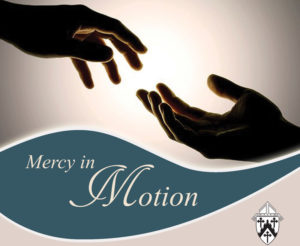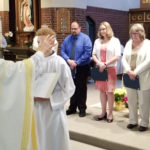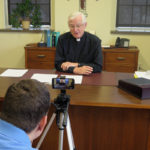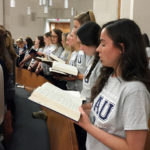By Emmaline Jurgena
The Catholic Messenger
Father Philip Bochanski of Connecticut spoke about his work with Courage, a Catholic apostolate that aims to provide pastoral care to people experiencing same-sex attraction, at the June Clergy Institute in Davenport.
Fr. Bochanski, associate director of Courage, offered clergy members gathered June 7 at Steeplegate Inn clarifying information about the church’s teachings on same-sex attraction, and gave advice about how to serve as administrators of a Courage chapter.
“Working with members of Courage and EnCourage (for families of loved ones with same-sex attraction) is the part of my priesthood where I feel most fortunate,” Fr. Bochanski said. “I think when we consider [Courage] in the abstract, it can be intimidating … but I can speak from experience that [Courage] has enriched my priesthood beyond what I could have imagined.”
One Courage member, Daniel Mattson, told his own story about coming to terms with his same-sex attraction, and finding comfort in his faith after returning to the Catholic Church and joining Courage.
“My whole life has been a search for happiness and joy and fulfillment, and I saw that in the faces of the people [at Courage],” he told the group.
Courage was founded in 1980 in New York City, and has since grown to more than 100 chapters around the world. EnCourage is an offshoot that offers support to families of individuals with same-sex attraction. Fr. Bochanski covered different aspects of the apostolate, including the importance of understanding same-sex attraction, anticipating questions that people may have about the issue, and offering effective and compassionate pastoral care to Courage members.
Fr. Bochanski emphasized the inherent goodness of people, explaining that the church makes a three-fold distinction in its evaluation of a person; in order to best serve someone, a clergy member should distinguish between the nature of a person (which is always good), the nature of a person’s desires, and the person’s actions. He gave examples of questions that are frequently asked by Courage members, or people interested in learning more about the group. Examples included questions about the church’s teaching on the origin of same-sex attraction, and whether the church expects individuals to change their orientation (Fr. Bochanski clarified that the church emphasizes chastity, rather than a change in orientation). However, he cautioned, active listening should precede any attempt to counsel or give advice.
“Once we learn to listen, then we can speak. But always listen, listen, listen, first,” Fr. Bochanski said.
Ultimately, each Courage meeting is intended to help members achieve the five goals of Courage in their daily life:
1) Chastity (achieved by living by the church’s teaching on homosexuality).
2) Prayer and dedication (achieved by participating in Mass, the sacraments of reconciliation and Eucharist, and dedication to a life of faith).
3) Fellowship (achieved by fostering an atmosphere of solidarity and the sharing of thoughts and experiences).
4) Support (achieved by encouraging chaste friendships).
5) Role model
The conference was intended to prepare clergy for implementation of Courage in the diocese. The presentations should help Courage administrators feel ready to serve their community, Fr. Bochanski said.
“Priests want to be faithful, and they want to be welcoming, and the world tells them they can’t do both … giving them strategies can help them be more confident in serving their parishioners,” he remarked.
Father Thom Hennen, one of the priests spearheading implementation of Courage in the diocese, said he was impressed with the amount of information conveyed in a single day. He also looks forward to capitalizing on the positive momentum from the conference during the roll-out of the diocesan Courage program.
When asked what point he hoped attendees of the conference came away with, Mattson said, “The best place to be, if someone feels themselves with same-sex attraction, is in the arms of the mother church. Everyone desires peace, joy, and fulfillment, and the church is the best place to find that.”
| More about same-sex attraction Mercy in Motion: A Ministries of Mercy Conference, to be held July 30 on the campus of St. Ambrose University in Davenport, will include a session on same-sex attraction. Father Jerry Kopacek, director of spiritual formation for St. Pius X Seminary at Loras College in Dubuque, will review church teaching on this issue. Fr. Kopacek meets monthly with a Courage group in Iowa City. He also helped establish a monthly Encourage support group in Dubuque in 2015, which works with families of individuals experiencing same-sex attraction. The Davenport Diocese is offering the conference in observance of the Year of Mercy. It will feature keynote speaker Tom East of Center for Ministry Development, a ministry fair, and a variety of sessions focused on how to develop and maintain various ministries of mercies within parishes and how to be involved as merciful ministers with organizations or ministries that implement works of mercy in the community. To register, go to: http://tinyurl.com/zuq6bl5. For more information, contact Marianne Agnoli at (563) 888-4242. |












A fundamental question that is vital to understanding and then responding to homosexuality is: What is your definition of homosexuality? If this is answered merely as “possessing a same-gender attraction”, it clearly is cut short. Is this a form of created human sexual orientation design, or a disorder to be suppressed and avoided under any circumstance. Within human sexual orientations (if there is more than one) action and intent can be unfavorable or favorable to love and commitment. It can bear good fruit or do harm. So its not the orientation itself that is wrong, but what the individual intends and conducts themselves within it. The topic, sadly, is still grossly misunderstood after so many centuries.